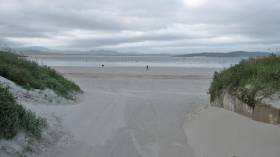Displaying items by tag: Downings
Windsurfing’s Youth Nationals At Downings This Weekend
#Windsurfing - Ireland’s windsurfing community will take over Downings in Co Donegal this coming weekend (22-23 July) for the 2017 Irish National Youth Championships.
The Blue Flag beach in the Donegal Gaeltacht has hosted a windsurfing competition each July since 1982, but this year is going national with its inaugural titles for girls and boys from under-sixes to under-18s.
Six main fleets – novice, gold, silver, longboards, konas and kiddies — will be hitting the surf after registration starts on the beach at 9am this Saturday 22 July.
The prizegiving ceremony will also take place on Downings beach from 4.30pm on Sunday 23 July.
For more see the event’s Facebook page HERE.
Abandoned Yacht Surprises Donegal Skipper
#GhostShip - It was an unsettling discovery for a Donegal skipper to happen upon a deserted yacht drifting in the Atlantic Ocean last week.
As BBC News reports, the unmanned vessel materialised in fog off Downings harbour in the north-west of the county, evoking memories of the famous Mary Celeste.
Fearing the worst, local charter boat operator Michael McVeigh sent two divers abroad to investigate, and all they found were rotting food and an e-mail address left on a note on the table.
But the mystery was soon solved after McVeigh contacted Malin Head coastguard - who confirmed that the yacht's owner had been rescued some 600 miles west of Galway.
The yachtsman had been sailing on a "dream trip" from his home in the Azores towards Iceland when he encountered difficulties and used his satellite phone to call for help.
He was later picked up by a passing freighter, leaving his yacht to drift.
BBC News has more on the tale here.































































